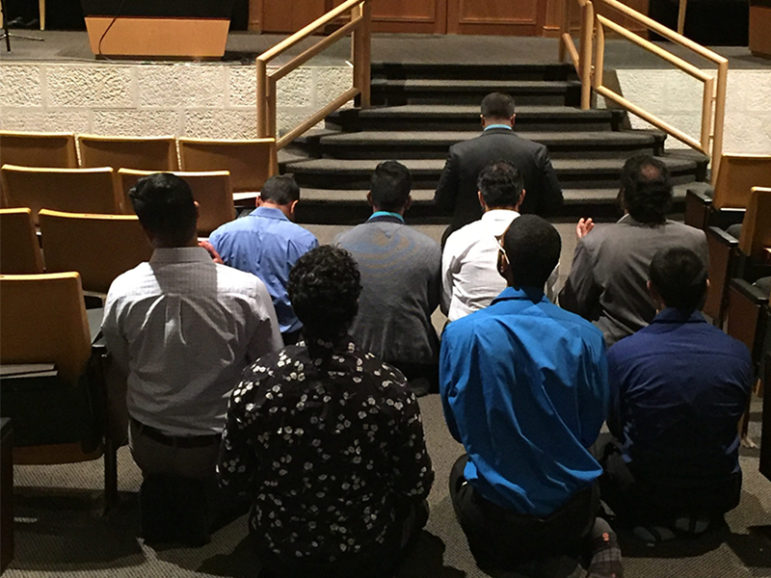(RNS) “Tell me again about this bar mitzvah thing.”
Those were the words of Shaikh Shafayat Mohamed, the leader of the Darul Uloom Institute in Pembroke Pines, Fla.
He and 10 of his young people were sitting in my study in Temple Solel in Hollywood, Fla. – along with 10 of our Jewish young people.
We were spending the evening together — studying and eating and talking — about how we want to combat fear. We knew that there is only one way to do that – and that is to combat ignorance.
I started with a prayer – “May God/Allah bless this conversation, in which our cousin faiths, descendants of Abraham through Isaac and Ishmael, would come to learn about each other’s lives, faiths and cultures.”
We opened our hearts to each other: about spirituality, the role of religious law in our lives, the role of gender, our twin struggles with modernity, and fundamentalism.
We talked about the chains of tradition – “shalshelet ha-kabbalah,” and the Muslim “silsila” – that bind each of us to the past and to the future.
When we encounter the other, it sharpens our own identity.
Our young Jews are unambiguous in their connection to the Jewish people. One young woman said: “I hope to marry a Jewish person. I want Judaism to continue. We lost too many people in the Holocaust. We need more Jews.”
Our new Muslim friends nodded. They expect to marry Muslims. They, too, want Islam – an Islam that will successfully interact with modernity – to continue and flourish. They, too, are afraid of ISIS.
They have seen the many compromises with tradition that American Jews have made, and they neither like it, nor envy it.
But where is our holy envy: What, in the faith and culture of the other, do you most admire and covet?
Our kids craved the certainty of their new Muslim friends, the sense that Muslim culture offers a sacred order to life – an order that they know Judaism also has, but they have not yet fully accessed.
And what did the Muslims crave in Judaism?
Bar and bat mitzvah.
Islam knows of serious life change at puberty. During the teen years, for example, Muslim girls can make the choice to wear the hijab.
But, they lack any kind of ceremonial way of marking that passage, and that is what they want.
Their longing reminds me of other American groups that have taken the imagined success of bar and bat mitzvah, and have decided to adopt it for their own use.
Some Episcopalian churches have created Rite 13, a group ceremony for 13-year-olds (that they got from Jewish confirmation, which Jews, in turn, got from German Lutherans).
Why shouldn’t contemporary Muslims “take” bar and bat mitzvah? Quite often, in the shared history of Jews and Muslims, ideas and customs, literary motifs and longings have flowed back and forth between our peoples.
Our Muslim guests did not know that the great Maimonides learned his philosophical moves from Muslim theologians.
Our young people did not know that the great Jewish poets of medieval Spain were jamming on themes that they got from Muslim poets, that Jewish mystics knew about the great Sufi poet, Rumi, and vice versa.
Judaism and Islam have more in common with each other, in terms of our life rhythms and structures, than either has in common with Christianity.
In that sense, we are common strangers in a strange land, trying to maintain our traditions, lest they be washed away in the great American assimilation machine.
The evening was getting long, and we were all getting hungry. We knew that there was much unfinished business that would take us beyond kumbaya. That would have to wait until next time.
But, before we could eat dinner, our Muslim friends made a small request. They had to pray the evening prayer.
That was my turn to become envious: How can liberal Jews retrieve that kind of prayer devotion?
Was there a place where they could pray?
Without hesitation, one of our young people suggested: “How about our sanctuary?”
And so, 10 Muslims kneeled in Temple Solel’s sanctuary. Rarely has its carpeting hosted such fervent prayer.
Ours was an act of sacred hospitality.
It was the kind of hospitality that our joint ancestor, Abraham (of whom Muslims say: peace be upon him – the exact translation of alav ha-shalom), demonstrated in the wilderness of his time. The ancient legends say his tent was open on all four sides, so as to be able to both see and welcome parched and hungry strangers into his tent.
So, from the supernal Garden of Eden, Abraham was smiling.
And so was God/Allah.
(Rabbi Jeffrey K. Salkin is the spiritual leader of Temple Solel in Hollywood, Fla. He writes the Martini Judaism column for RNS)






